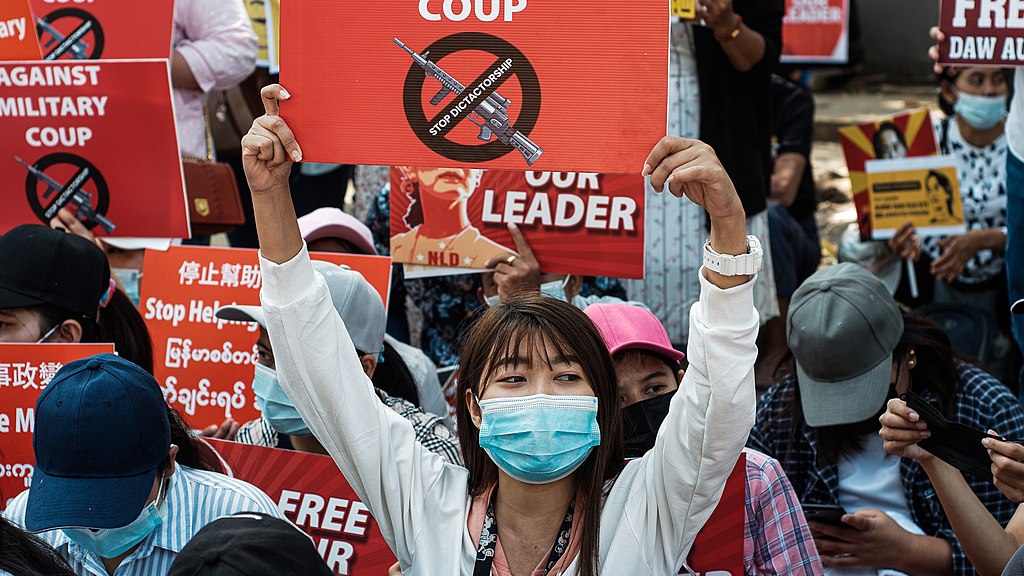Feb. 1 marked the two year anniversary since the military coup d’état in Myanmar, which tore down the country’s fragile parliamentary democracy and arrested its top leaders (who had assumed power in the November 2020 elections), placing the power in the hands of General Min Aung Hlaing and his military junta.
Since then, the country has faced an outbreak of violence between the military, known as the Tatmadaw, and civilian protesters fighting for democracy. Village bombings, fires, shootings and targeted assassinations are all part of the conflict, with a total of 2,986 killings and 17,725 arrests, according to the Assistance Association for Political Prisoners.
Some of the leaders that were imprisoned in 2021 are now facing additional charges by the military regime. Former State Counselor of Myanmar, Nobel Peace Prize winner and advocate for democracy Aung San Suu Kyi was accused of election fraud in the 2020 elections and found guilty of corruption in December 2022. She was sentenced to seven years in prison, which added to the 26 years for other charges she has received since 2021.
Burmese civilians marked the coup’s two year anniversary with a nationwide silent strike. Meanwhile, the Tatmadaw has extended the state of emergency for another six months, delaying any possible new elections.
“It’s like the Wild West.”
Mimi
Coup d’états have been common throughout Myanmar’s history. In 1962, General Ne Win seized power from U Nu’s democratically elected government. While in power, Ne Win nationalized most aspects of society and implemented a one-party government under the Burma Socialist Programme Party (BSPP).
Ne Win was forced to step down after nationwide protests for democracy in 1988. General Saw Maung stepped in to brutally suppress the protests and appease the public by promising elections in 1990. Around this time, Aung San Suu Kyi formed the National League for Democracy (NLD), which won the majority vote. However, the Tatmadaw did not allow them to form the government, and forced them to sign a constitution that guaranteed the army 25% of seats.
Finally, in 2011, a period of “liberalization” began. In 2012, the NLD became the majority party and it seemed that Myanmar was slowly moving towards democracy. That is, until 2021.
“Now it’s becoming a full blown civil war,” Burmese citizen Mimi said. (Mimi requested to be referred to by her first name for security reasons.)
The youth have been a significant part of the protests. They formed the People’s Democratic Forces (PDF), a student army that is using its own skills to build homemade guns and bombs to retaliate against the army. However, neither side has full control over Myanmar, which is leaving room for lawlessness and war crimes. “It’s like the Wild West,” Mimi said.
Winners of the 2020 election who fled after the 2021 coup formed a government in exile, the National Unity Government (NUG). They gained representation in the United Nations (UN), which passed a resolution in December demanding that Myanmar cease killings and that the world recognize the NUG as the country’s official government. The NUG has not been internationally recognized, but its foreign minister is currently traveling around the world to gain support.
Kit Young is an American musician and teacher who first became interested in Myanmar when she began learning the Burmese piano and language in 1987. She lived in Myanmar from 2003 to 2008.
Young started the Gitameit Music Center, a music school, with Burmese musicians in 2004. The school teaches general music skills in pop, jazz, classical and Burmese music at its campuses in Yangon and Mandalay. In 2021, she coordinated a project with a grant from the U.S. embassy to train Gitameit teachers to use poetry, theater and songs to help their communities get though personal and collective trauma.
“Everybody was so completely, completely devastated by eight months of guns and bombs… and being questioned by soldiers and having people die right in front of you,” Young said.
The project also involved creating an online library that includes resources with techniques on how to center oneself and heal from trauma through art and mindfulness practices.
Currently, there are eight teachers from the school working with small groups of internally displaced children dealing with trauma. When the coup occurred, the school was virtual because of the pandemic, and the teachers decided to remain virtual afterwards. Though safer, the school still struggled due to the government cutting off internet access. The school is starting to move to a hybrid model, but many still prefer to stay virtual.
“The head of our piano department lives in an area where there’s pretty frequent weirdness [and] bombings,” Young said. “She said they built this bridge where there’s snipers that just walk back and forth, looking at the street.”
Another challenge the school faced was demands from local security that they owed $3,000 USD in taxes, which Young calls a “completely arbitrary number.” They want to tax the school’s electricity, which has not been used for two years, and land, even though the school is on a religious land exemption grant.
Mimi owns a restaurant with her husband in Myanmar, and the government also demanded money, even though the restaurant was closed due to the pandemic and the coup.
Mimi and her husband were in Myanmar when the coup took place, but managed to leave the country in May 2021. Mimi is in California now, but plans to go back soon to check on their properties. However, she is aware of the danger. “You just have to watch your mouth and mind your own business,” she said.
“30, 32 years later we’re doing the same thing. That’s how invidious, how horrible this government is.”
Kit Young
Young and Mimi worked together in the 1990s to empower Burmese youth and help reform the government. Recently, Young attended a Burma Round Table in Washington D.C. again, which was organized by the NUG. This gathering of American government and non-profit groups began in the 1990s to discuss how to assist the people of Myanmar. Young calls it “deja vu” how a new generation is back to doing similar work.
“That’s why it’s so sad. 30, 32 years later we’re doing the same thing,” she said. “That’s how invidious, how horrible this government is.”
Both Young and Mimi feel that Americans are not aware enough about the situation in Myanmar due to the lack of media coverage and a general numbness to violence. “People are just so used to all this conflict,” Mimi said. “They don’t have any more feelings.”
Furthermore, there is a lack of motivation worldwide to actually step in to assist the democracy protesters, according to Young. “Music and the protest art from the coup briefly dazzled everybody in the world,” she said. “But that was, from my mind, sort of artificial because people were interested in the art itself and the power of the protest, not in the answer, not in actually helping.”
The U.S. Congress recently passed the Burma Act of 2021, which imposed sanctions on the Burmese government in response to their human rights violations. However, Mimi believes that the only way the government will be reformed is if members within it step up to make a change. She believes that there are people in the army who want to step up, but are too afraid to do so.
“This is really the first time the young generation is coming up and the [ethnic groups are] coming together with the Burmese majority. This is a real opportunity, and once we lose it, it’s going to be a failed state.”
Mimi
She has faith, however, that the youth have been brought together by the internet, making them more committed to their ambitions.
Young also believes that it is important that the youth continue to fight for democracy in Myanmar to ensure that the country does not end up in a never ending cycle of failed democracy.
“We’ve done our thing,” Young said, referring to her generation. “It’s up to them.”
To honor the heroism and ingenuity of the youth, Mimi hopes the world will continue to focus on Myanmar. “The world has to keep publicity on it because this is really the last chance,” she said. “And this is really the first time the young generation is coming up and the [ethnic groups are] coming together with the Burmese majority. This is a real opportunity, and once we lose it, it’s going to be a failed state.”
By Naomi Breuer



































































